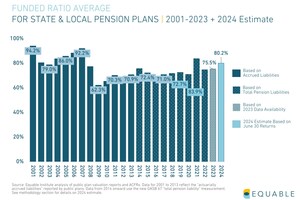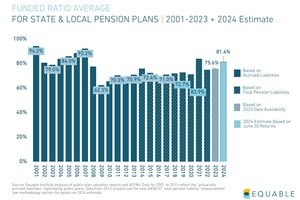Equable Institute Analysis Shows U.S Statewide Public Pension Funds Entering COVID-19 Pandemic Recession in Worse Position Than 2008
Report also finds that only 1 in 5 public pension plans is resilient enough to weather future market shocks; funding shortfall to grow to $1.62 trillion in 2020, bringing funded ratio to a near-low point
NEW YORK, Aug. 18, 2020 /PRNewswire/ -- A new report by Equable Institute exploring public retirement system trends found that despite a decade-long bull market, U.S. statewide public pension funds entered the COVID-19 recession in a worse position than the Great Recession of 2008. The analysis also finds that as of the end of 2019, only 1 in 5 public pension funds is resilient enough to weather future market downturns. Equable Institute estimates unfunded liabilities will grow to $1.62 trillion in 2020 (up from $1.35 trillion in 2019), bringing the total aggregate funded ratio to 67.9% - nearly its lowest point in modern history.
The report, State of Pensions 2020, analyzes trends in public pension funding, investments, contributions, cash flow and maturation for 143 of the largest statewide retirement systems in all 50 states, with at least $1 billion in accrued liabilities. The 2020 edition of the report also illuminates the far-reaching impact of COVID-19, by analyzing post-Great Recession pension funding and policy trends.
"For state leaders to understand the best ways to navigate their retirement system challenges in the age of COVID-19, it is critical to understand the trends for pension systems following the Great Recession" said Anthony Randazzo, Equable's executive director and report co-author. "There are lessons about what policies should be avoided, and what some states did to break from the pack and recover before this most recent economic downturn."
While State of Pensions 2020 finds that public pension funding is declining nationally, deeper analysis shows a more complex reality. Specifically, it finds:
- Five states (California, Illinois, New Jersey, Texas, and Pennsylvania) account for more than 50% of the United States' public pension unfunded liabilities.
- Several states have been making strides toward improving the resilience of their pension plans, adopting various kinds of risk-sharing policies and contribution rate ramp-ups.
- As a result of the COVID-19 recession and financial market turbulence, several statewide plans' funded status has meaningfully decreased year over year. Half of the plans with a resilient funded status (greater than 90% funded) at the end of 2019 slipped into a fragile position (60% to 90% funded). Another 12 plans moved from fragile to distressed funded status (less than 60% funded). (These estimates are based on projected plan returns as of June 30, 2020).
- While assumed rates of return have been steadily falling and are currently at an all-time low, they are likely still too optimistic given the current low interest rate environment, unless pension funds want to continue adding more investment risk. If assumed returns had kept pace with declining interest rates since 2001, the average assumption in 2019 would have been around 5.1%. Today, the average assumed rate of return is 7.2%.
- Although contribution rates have progressively increased (a positive trend from the perspective of plan funding), benefit payments are growing steadily too (because of increased retirements), resulting in a net negative cashflow of -$113 billion for 2019. This trend since 2009 makes it increasingly difficult for plans to invest their way back to health.
- States with some of the most visible pension funding challenges, including New Jersey, Kentucky, and Illinois, have the largest unfunded liabilities relative to their state's GDP, topping 15% respectively.
For a deeper look into The State of Pensions 2020, visit www.Equable.org/StateofPensions to access additional downloads and interactive data visualizations. Additional media tools including figures, fact sheets and raw data can be found here.
About Equable Institute
Equable is a bipartisan non-profit that works with public retirement system stakeholders to solve complex pension funding challenges with data-driven solutions. We exist to support public sector workers in understanding how their retirement systems can be improved, and to help state and local governments find ways to both fix threats to municipal finance stability and ensure the retirement security of all public servants.
Equable.org | Twitter: @EquableInst | Facebook: @EquableInstitute | Instagram: @EquableInst
SOURCE Equable Institute

Related Links
WANT YOUR COMPANY'S NEWS FEATURED ON PRNEWSWIRE.COM?
Newsrooms &
Influencers
Digital Media
Outlets
Journalists
Opted In





Share this article